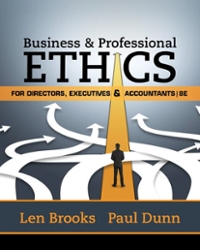The Italian federal corporate tax system has an official, legal tax structure and tax rates just as
Question:
The Italian federal corporate tax system has an official, legal tax structure and tax rates just as the U.S. system does. However, all similarity between the two systems ends there.
The Italian tax authorities assume that no Italian corporation would ever submit a tax return that shows its true profits but rather would submit a return that understates actual profits by anywhere between 30% and 70%; their assumption is essentially correct. Therefore, about six months after the annual deadline for filing corporate tax returns, the tax authorities issue to each corporation an “invitation to discuss”
its tax return. The purpose of this notice is to arrange a personal meeting between them and representatives of the corporation.
At this meeting, the Italian revenue service states the amount of corporate income tax that it believes is due. Its position is developed from both prior years’
taxes actually paid and the current year’s return; the amount that the tax authorities claim is due is generally several times that shown on the corporation’s return for the current year. In short, the corporation’s tax return and the revenue service’s stated position are the operating offers for the several rounds of bargaining that will follow.
The Italian corporation is typically represented in such negotiations by its commercialista, a function that exists in Italian society for the primary purpose of negotiating corporate (and individual) tax payments with the Italian tax authorities;
thus, the management of an Italian corporation seldom, if ever, has to meet directly with the Italian revenue service and probably has a minimum awareness of the details of the negotiation other than the final settlement.
Both the final settlement and the negotiation are extremely important to the corporation, the tax authorities, and the commercialista. Since the tax authorities assume that a corporation always earned more money this year than last year and never has a loss, the amount of the final settlement, that is, corporate taxes that will actually be paid, becomes, for all practical purposes, the floor for the start of next year’s negotiations. The final settlement also represents the amount of revenue the Italian government will collect in taxes to help finance the cost of running the country.
However, since large amounts of money are involved and two individuals having vested personal interests are conducting the negotiations, the amount of bustarella—typically a substantial cash payment
“requested” by the Italian revenue agent from the commercialista—usually determines whether the final settlement is closer to the corporation’s original tax return or to the fiscal authority’s original negotiating position.
Whatever bustarella is a paid during the negotiation is usually included by the commercialista in his lump-sum fee “for services rendered” to his corporate client. If the final settlement is favorable to the corporation, and it is the commercialista’s job to see that it is, then the corporation is not likely to complain about the amount of its commercialist’s fee, nor will it ever know how much of that fee was represented by bustarella and how much remained for the commercialista as payment for his negotiating services. In any case, the tax authorities will recognize the full amount of the fee as a tax-deductible expense on the corporation’s tax return for the following year.
About ten years ago, a leading American bank opened a banking subsidiary in a major Italian city. At the end of its first year of operation, the bank was advised by its local lawyers and tax accountants, both from branches of U.S. companies, to file its tax return “Italian style,” that is, to understate its actual profits by a significant amount. The American general manager of the bank, who was on his first overseas assignment, refused to do so both because he considered it dishonest and because it was inconsistent with the practices of his parent company in the United States.
About six months after filing its
“American-style” tax return, the bank received an “invitation to discuss” notice from the Italian tax authorities. The bank’s general manager consulted with his lawyers and tax accountants who suggested they hire a commercialista. He rejected this advice and instead wrote a letter to the Italian revenue service not only stating that his firm’s corporate return was correct as filed but also requesting that they inform him of any specific items about which they had questions. His letter was never answered............
Questions:-
1. Should the Italian bank’s general manager hire a commercialista and pay bustarella?
2. Should the general manager phone the bank’s American CEO in New York and ask for advice?
3. If you were the bank’s American CEO, would you want to receive the phone call for advice?
This case, which is based on an actual occurrence, was prepared by Arthur L.
Kelly. The author is the Managing Partner of KEL Enterprises L.P., a private investment partnership. He has been actively involved in international business for more than forty years and has served as a member of the Boards of Directors of corporations in the United States and Europe.
These currently include BASF Aktiengesellshaft and Bayerische Motoren Werke (BMW) A.G. in Germany as well as Deere & Company, Northern Trust Corporation, and Snap-on Incorporated in the United States. Copyright 1977. All rights reserved.
Step by Step Answer:

Business And Professional Ethics
ISBN: 9781337514460
8th Edition
Authors: Leonard J Brooks, Paul Dunn





